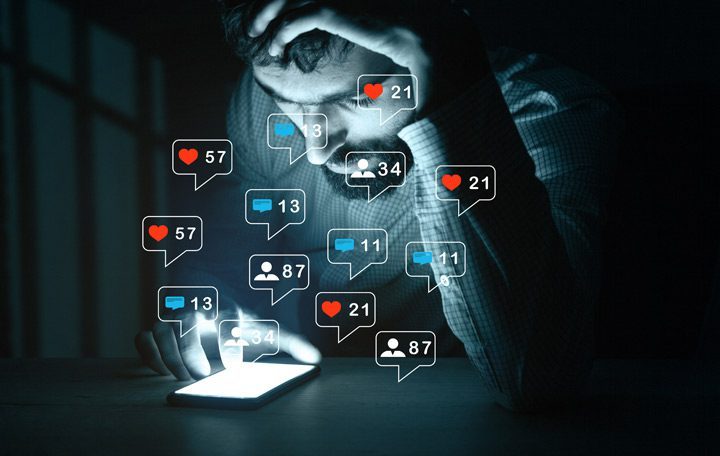
In many respects, social media can be an effective point of meaningful connection for many people—such as Cottonwood’s Instagram and Facebook pages, for example. But some experts believe it might do more harm than good. Which is right? Depending on how you view social media, you might already have an opinion about this issue.
The Initial Intention of Social Media
According to Digital Trends, the concept of interaction between people remotely started long before the widespread accessibility of the internet. In the early 1980s, bulletin board systems were public forums used by software engineers and gamers, which expanded as these boards became networked. In the 1990s, companies such as CompuServe and America Online (AOL) introduced ways to share files, email, and develop personal membership profiles. More diverse social sites came on board by the early 2000s, including AsianAvenue.com, BlackPlanet.com, and MiGente.com—and all three still exist today.
Classmates. Friendster. SixDegrees. MySpace. Various dating sites. Once the internet became commonplace, so did digital connection. With just a brief social media overview, it’s easy to see why it’s a juggernaut today: humans want to stay connected. It’s a survival imperative.
But is there a dark side? Perhaps. In a 2018 interview with Vox, Sherry Turkle—a notable sociologist and psychologist at MIT—said, “Mobile technology means we’re always on, always plugged in, always stimulated, always in a constant state of self-presentation. Psychologically, that’s a game changer. Living through our screens…we become actors in our own personal drama…we talk a lot about authenticity, but actually what we’re doing is curating the self.”
Where Social Media Is Today
According to Data Reportal, as of January 2022, there were approximately 4.6 billion social media users around the world: roughly 58 percent of the total world’s population aged 13 and above. Those numbers might be greater for platforms that allow users under 13.
Most people engage with one or more of the primary 17 social media platforms worldwide. Data Reportal released research findings that identify some of the top reasons people cite for using social media. Here are just a few points from respondents:
- Roughly 48 percent want to keep up with friends and family.
- About 36 percent do it in their spare time.
- An average of 35 percent access news and other trending stories.
- Approximately 22 percent of people use social channels to find like-minded communities and special interest groups, and post about their lives.
- About 17 percent access social media to support and connect to good causes.
Additionally:
- Men use social media slightly more than women: 53.9 percent vs. 46.1 percent.
- Of the primary social media platforms, Facebook is still the most widely used, with 2.9 billion active users. Facebook’s parent company, Meta, also owns other top-performing platforms,
including WhatsApp and Instagram. - As you might expect, platform preference varies considerably by age.
- There’s also a lot of overlap. For example, the average Twitter user is also on no fewer than four additional platforms.
So with these particular stats, it doesn’t seem there’s much to be concerned about with social media, right? Let’s take a closer look.
What the Studies Say
Numerous studies examine some of the negative impacts of social media—one went as far as to say that “social media are responsible for aggravating mental health problems,” especially with relation to depression and anxiety.
Other findings are still inconclusive, but a news report from NBC26 summarizes a collective of studies with a prime directive: limit time on social media, set boundaries, and don’t scroll before bedtime.
Here are some other aspects to consider:
HelpGuide recommends to evaluate “what’s driving your social media use: if you’re spending an excessive amount of time on social media and feelings of sadness, dissatisfaction, frustration, or loneliness are impacting your life, it may be time to re-examine your online habits and find a healthier balance.”
Mindwise advises to “put your mental health first: check in with yourself and if you’re feeling down, maybe go outside for a walk or grab coffee with a friend rather than spending time online. If getting notifications throughout the day makes you feel stressed or anxious then it would be a good idea to delete the social media apps from your phone or disable push notifications, so you only see alerts when you sign in manually.”
MIT News suggests that you “start your day intentionally: as easy as it is to pick up your phone and start scrolling from your bed, it may not be the healthiest way to begin your day, as you cannot control what you’re going to see. Seeing something negative could potentially contribute to negative subconscious thoughts that put one at risk for unhealthy patterns […]. Try starting with meditation, prayer, stretching, or positive affirmations instead. These alternatives are likely to support a healthier internal monologue.”
Cottonwood Is Ready to Help
While we’re proud of our social media network, we’re also first to say that nothing takes the place of a face-to-face community of support when you really need it. If you recognize that mental and emotional stability should be your first priority and want guidance, the board-certified professionals at Cottonwood have the compassionate resources you need.







